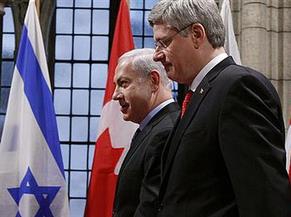|
World Jewish News

Canadian Prime Minister Stephen Harper (R) with his Israeli counterpart at the Canadian parliament in Ottawa.
|
Canada recognizes Israel’s right to defend itself through military action
05.03.2012, Israel and the World Canadian Prime Minister Stephen Harper said Canada wants to see a "peaceful resolution" to the crisis over Iran's nuclear program but he added that he recognizes Israel's right to defend itself through military action.
The comments came during a press conference at the Canadian parliament with visiting Israeli Prime Minister Benjamin Netanyahu.
"We, of course, recognize the right of Israel to defend itself as a sovereign state. That said, we want to see a peaceful resolution of this issue. And we want to see every action taken to get a peaceful resolution of the situation,»’ Harper declared when asked by journalists if Canada would support a unilateral military strike by Israel against Iran to stop its nuclear program.
Netanyahu warned that Iran poses a "grave threat" to global security and said that Israel is prepared to "defend" itself if necessary. "The international community must do everything it can to stop it. The danger is not only to Israel - But I think it is a danger to the whole world,» he added.
But he was careful not to appear to be pressuring the US. "I have not set red lines and we are not seeking to set red lines to the United States," he said in Hebrew.
"We do ask to reserve the freedom of action of the state of Israel in the face of threats to wipe us off the map. I think that is something that any state would demand for itself.»
To allay suspicions, Netanyahu says Iran must dismantle its underground nuclear facility in Qom, stop uranium enrichment and eliminate all enriched material beyond what it needs to make medical isotopes or generate nuclear power.
"And when I say all the material, I mean all the material, from 3.5 percent up," Netanyahu said.
Canada under the Harper government is one of Israel’s major allies in the world.
But earlier on Friday, Canadian Foreign Minister John Baird said that "we obviously don't want to see any military action. That's why we're working hard with the United States and the European Union, with the United Kingdom and others to take every single diplomatic effort necessary to try to ensure that Iran doesn't achieve nuclear weapons status."
After Canada, Netanyahu was scheduled to head to the US where he is due to address he American Israel Public Affairs Committee (AIPAC) Conference on Sunday and meet with President Barack Obama on Monday.
Obama on Friday warned against a premature attack on Iran but that said if sanctions failed to curb Tehran's atomic ambitions, US military action against Iranian nuclear facilities should not be ruled out.
"I think that the Israeli government recognizes that, as president of the United States, I don't bluff," the president told the Atlantic Monthly magazine.
"I also don't, as a matter of sound policy, go around advertising exactly what our intentions are. But I think both the Iranian and the Israeli governments recognize that when the United States says it is unacceptable for Iran to have a nuclear weapon, we mean what we say."
US strategy included isolating Tehran politically, sanctions and diplomacy, Obama said.
"And it includes a military component. And I think people understand that," he added.
Obama warned, however, that a premature military strike could inadvertently help the Iranian regime.
"At a time when there is not a lot of sympathy for Iran and its only real ally (Syria) is on theropes, do we want a distraction in which suddenly Iran can portray itself as a victim?" Obama said.
Tangi Quemener from AFP in Washington contributed to this report.
EJP
|
|
